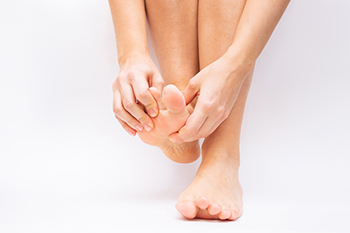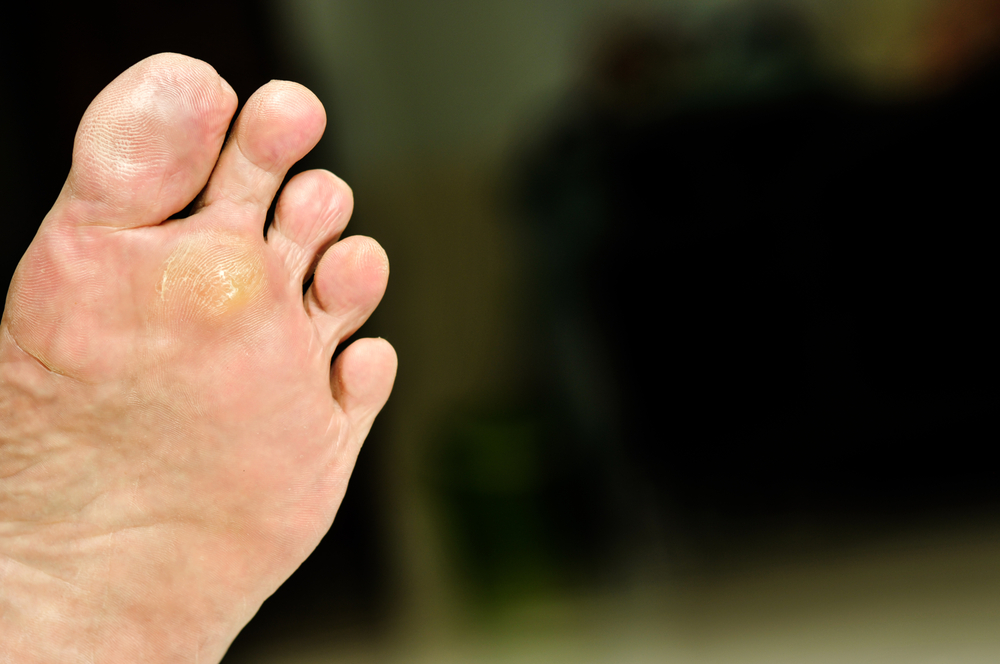Connect With Us
Blog
We Can Treat Your Foot or Ankle Pain
How Body Weight Can Affect the Feet

Many parts of the body become smaller when excess weight is lost, and this is also true of the feet. It is beneficial to have the feet properly measured when purchasing new shoes, and this will help to ensure a good fit. Research has indicated the feet absorb approximately 120 percent of the body’s weight, and this may explain why foot pain may occur. The excess weight may stretch tissues and muscles, in addition to natural fad pads wearing down. Additionally, the feet and ankles may swell from the added weight, and may generally feel uncomfortable. Many patients have noticed that by losing weight, their feet will feel better, and existing foot conditions may be alleviated. The bone structure of the foot may not change, but the width may be affected, and become smaller. It is beneficial to exercise as often as possible, and this can help the health of the feet. Eating foods that are low in sodium can help to diminish existing swelling, and wearing shoes may become easier. If you have questions about foot health before or after weight is lost, please consult with a podiatrist who can address any concerns you may have.
The more you weigh, the harder your feet must work to support your body. If you’re an obese individual and are concerned about your feet, contact one of our podiatrists from Foot & Ankle Associates of Maine. Our doctors can provide the care you need to keep you pain-free and on your feet.
Obesity and Your Feet
People who are overweight are putting more pressure on their ankles, knees, and hips as well as their feet. This unfortunately can lead to variety of different issues.
Problems & Complications Stemming from Obesity
- When the body is overweight, it tries to compensate by changing the way that it moves. An obese person may lean forward and put extra weight on the wrong part of the foot. This puts unnecessary stress on the feet.
- Obese people are also more likely to develop type II diabetes which is a condition that causes a lot of foot problems. People with diabetes often don’t feel the cuts and sores that they may have on their feet, which can lead to more complicated and severe issues.
- Plantar fasciitis is another foot condition that can be caused by obesity. Plantar fasciitis is an inflammation of the tissue along the bottom of the foot, which causes pain and stiffness while walking and climbing stairs.
If you have any questions, please feel free to contact our office located in Brunswick, ME . We offer the newest diagnostic and treatment technologies for all your foot care needs.
Arthritis in the Big Toe

The big toe plays an important role in our ability to walk and remain balanced. The place where the big toe connects to the foot is called the metatarsophalangeal joint (MTP). This joint, like many others in the body, is often the target of osteoarthritis because it gets a lot of wear and tear. Symptoms include pain (especially while active), stiffness, swelling, and a shifting of weight when you walk (change in gait). Occasionally, the big toe pushes toward the other toes, forming a bunion. Stiffness in the joint can result in a difficulty walking, which then can lead to the formation of calluses, corns, and hammertoes. The risk of developing osteoarthritis increases as you age, but other factors such as genetics, obesity, and prior joint injury can contribute to it. As with any progressive disease, osteoarthritis in the big toe can only become worse. Getting treatment from a podiatrist as early as possible is a good idea. X-rays can often detect the extent of the damage to the MTP joint and help the doctor to determine treatment options. Among them are certain prescription medications, changes in footwear, and in severe cases, surgery. For more information on osteoarthritis of the big toe, please consult a podiatrist.
Toe pain can disrupt your daily activities. If you have any concerns, contact one of our podiatrists of Foot & Ankle Associates of Maine. Our doctors can provide the care you need to keep you pain-free and on your feet.
What Causes Toe Pain?
Most severe toe pain is caused due to a sports injury, trauma from dropping something heavy on the toe, or bumping into something rigid. Other problems can develop over time for various reasons.
Toe pain can be caused by one or more ailments. The most common include:
- Trauma
- Sports injury
- Wearing shoes that are too tight
- Arthritis
- Gout
- Corns and calluses
- Hammertoe
- Bunions
- Blisters
- Ingrown toenails
- Sprains
- Fractures (broken bones)
- Dislocations
When to See a Podiatrist
- Severe pain
- Persistent pain that lasts more than a week
- Signs of infection
- Continued swelling
- Pain that prevents walking
Diagnosis
In many cases the cause of toe pain is obvious, but in others, a podiatrist may want to use more advanced methods to determine the problem. These can range from simple visual inspections and sensation tests to X-rays and MRI scans. Prior medical history, family medical history, and any recent physical traumatic events will all be taken into consideration for a proper diagnosis.
Treatment
Treatments for toe pain and injuries vary and may include shoe inserts, padding, taping, medicines, injections, and in some cases, surgery. If you believe that you have broken a toe, please see a podiatrist as soon as possible.
If you have any questions please feel free to contact our office located in Brunswick, ME . We offer the newest diagnostic tools and technology to treat your foot and ankle needs.
When Plantar Warts Spread

Plantar warts are caused by the human papillomavirus (HPV), and they typically develop on the bottoms of the feet, usually on the balls or heels. These warts can, unfortunately, be particularly painful for some individuals when they walk or put weight on their feet. Since plantar warts are located on the bottoms of the feet, they may essentially grow inward in response to the pressure that is put on the soles of the feet. Plantar warts have a pernicious ability to spread to other parts of the feet and body sometimes very easily. For example, you might unknowingly be spreading your plantar warts if you touch the wart and then immediately touch another part of your body. Additionally, you may be spreading your plantar warts to other people if you share personal self-care tools such as razors or towels. It is not beneficial to your health if your plantar warts begin to spread. If this happens, a medical professional might advise you to use over-the-counter medications to address the problem. If you have plantar warts, you ought to contact a podiatrist especially if you notice that they are beginning to spread. A podiatrist is a foot specialist who can help you take specific steps to identify and address the problem.
Plantar warts can be very uncomfortable. If you need your feet checked, contact one of our podiatrists from Foot & Ankle Associates of Maine. Our doctors will assist you with all of your foot and ankle needs.
About Plantar Warts
Plantar warts are the result of HPV, or human papillomavirus, getting into open wounds on the feet. They are mostly found on the heels or balls of the feet.
While plantar warts are generally harmless, those experiencing excessive pain or those suffering from diabetes or a compromised immune system require immediate medical care. Plantar warts are easily diagnosed, usually through scraping off a bit of rough skin or by getting a biopsy.
Symptoms
- Lesions on the bottom of your feet, usually rough and grainy
- Hard or thick callused spots
- Wart seeds, which are small clotted blood vessels that look like little black spots
- Pain, discomfort, or tenderness of your feet when walking or standing
Treatment
- Freezing
- Electric tool removal
- Laser Treatment
- Topical Creams (prescription only)
- Over-the-counter medications
To help prevent developing plantar warts, avoid walking barefoot over abrasive surfaces that can cause cuts or wounds for HPV to get into. Avoiding direct contact with other warts, as well as not picking or rubbing existing warts, can help prevent the further spread of plantar warts. However, if you think you have developed plantar warts, speak to your podiatrist. He or she can diagnose the warts on your feet and recommend the appropriate treatment options.
If you have any questions please feel free to contact our office located in Brunswick, ME . We offer the newest diagnostic and treatment technologies for all your foot and ankle needs.

